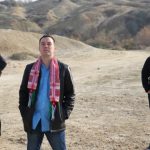An old proverb says, “If you want to go fast, go alone, but if you want to go far, go together.” Collaboration is something that we must all do in one way or another. As followers of Jesus, collaborating with other Christians can help us make more of a kingdom impact.
No one church or ministry has all of the knowledge, tools, resources, staff, or funding to reach everyone God has called them to reach. By collaborating with other churches and ministries, they can increase their impact exponentially.
The same is true of other types of Kingdom work. Take Indigitous #HACK for example. This October, the global missional hackathon will return for the seventh time. We’re trusting God for thousands of people to gather in more than 200 locations around the world to work on projects that can help take the Gospel to new people, places, and spaces. But why do we even have the hackathon? Is it just to give people something fun to do for a weekend?
Of course not. We hold Indigitous #HACK because we believe that God has written digital into the story of so many people, that God has gifted many of us with digital and creative talents – the developers, programmers, engineers, project managers, UX experts, and more. But by themselves, most such people don’t know how to use their talents for God. They don’t know of a project to which they can contribute. And they need help.
Most projects don’t need just one thing. If an app needs coding, it probably also needs someone to make sure the UX and UI are good. It probably needs a project manager to make sure the work meets the needs of the end user. It probably needs designers to ensure that the work that is coded has the right look, feel, and experience. And so forth.
That’s why collaboration is so important. It’s why we gather people every October to work on projects with missional impact.
But collaboration doesn’t always come easily. In fact, collaboration is often hard. Going back to the old proverb, there’s a reason it’s faster to work alone. Collaboration requires good communication, working for mutual interests, a lot of planning, and solid relationships. We discussed collaboration with Andrew Feng on a recent episode of Indigitous CoffeeTalks to learn more about how to collaborate well.
Andrew is the US Expansion Lead for Indigitous and a large part of that role entails meeting with ministries around the United States to find ways to partner and collaborate more effectively, all with the goal of helping more people around the country become engaged in digital missions. Andrew also leads a program called Indigitous Serve, which engages university students to do something for Jesus beyond the walls of their church.
In 2020, after the #HACK event wrapped up, Andrew found that two of the event’s leaders were disappointed it was ending. They wanted a way to continue working together and collaborating on the projects they’d started that weekend. Andrew then worked with them to create the first Indigitous Serve cohort, which launched in January 2021. The idea was to get students involved in missions not by stepping far out of their comfort zone, but by utilizing the skills they were already using and learning. So they recruited some students from a variety of Christian colleges.
“We said, ‘What would it look like if a group of young adults use their skills that they learned Monday through Friday outside the four church walls and worked with a local ministry?’” Andrew says.
They decided to partner with The Joshua Project, an organization that maintains ethnological data to support Christian missions. “We thought it was critical for us to help the younger people see that there’s a need for missions information,” Andrew says.
Go and create
One of the ways that Andrew helps people collaborate and engage in missions is by focusing on what each person can do. Find their passions and talents and you can find ways for them to contribute.
“Our opportunity that we presented was ‘go and create,’” Andrew says. “If you can code for the Kingdom, go create for the Kingdom. If you want to make videos for the Kingdom, make videos.”
One group of students said they didn’t know anything about coding, but they were artists. Can drawing be something that helps the Kingdom of God? It can. Andrew led the artists to draw characters that would be used in the Who Are Frontier People Groups booklet.
The booklet takes the data from The Joshua Project and uses cartoons and stats to provide easy-to-understand information on each people group as well as simple ways to pray for them. Each people group is represented by a different character, has a brief story, and a QR code for prayer points.
“It was all about empowering students,” Andrew says.
Once they had a prototype of the prayer booklet, Andrew met with various ministries to get their feedback and find out if it would be helpful. The Indigitous Serve cohort then revised the booklet based on that feedback and created translations in multiple languages.

Identify affinities
Mobilizing students to do volunteer work isn’t an easy task, especially considering they’re already busy with their schoolwork, social lives, and jobs. To Andrew, the key to motivating students to collaborate on the project was finding their interests.
“We identified their affinities. They love to draw and have a heart for missions,” Andrew says. “Maybe they just haven’t had an opportunity.”
Churches often ask people to join what they’re doing, but Andrew instead wanted to ask if there’s a way the students could do something they already enjoyed.
“If you think about a church, the ask would be to lead a Bible study or join the worship team or be a greeter or help with the nursery,” Andrew says. “These people are gifted and passionate about drawing but there’s no platform for them. So we said, ‘What if you could draw for the Kingdom?’ When we asked, it was a low barrier to entry for them.”
Find their yes
Collaboration requires mutual interest. Sometimes Andrew approaches someone about collaboration with his own ideas about how the other person can contribute. But they say no. Instead of being frustrated or giving up, he pivots and tries to find out what the person would say yes to.
In terms of commitment, sometimes people can devote a lot of time and effort to collaboration, but other times they just don’t have much capacity. Andrew always tries to right-size the effort to fit the person’s capacity.
“If you want to do one hour of work, let’s figure out what that one hour of work would look like. If you’re going to do ten hours of work, let’s figure out what ten hours of work would look like,” he says.
Why not?
Everyone has something they’re passionate about, something that they want to create or change. Everyone has some God-given talent.
“Think about all of the abilities that God has entrusted you with and as you’re stewarding your time and talents, there’s a global audience that needs your ability and needs your time. Why not give one hour towards global missions, towards mobilization, storytelling?” Andrew says. “Why not come alongside to try it out? Who knows? You might actually enjoy the process and create a pretty cool product out of it.”

